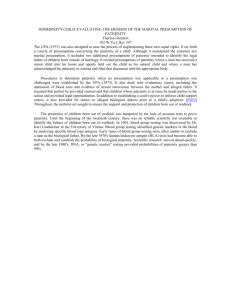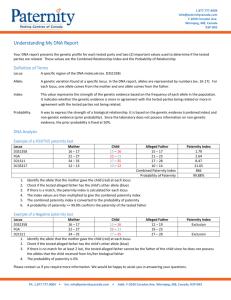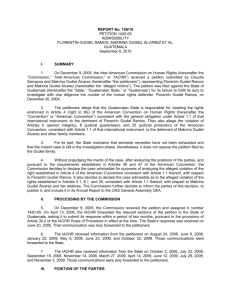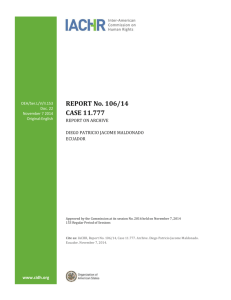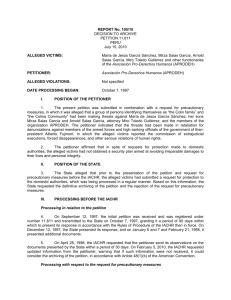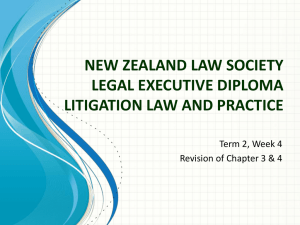Report No. 68/11 - Organization of American States
advertisement
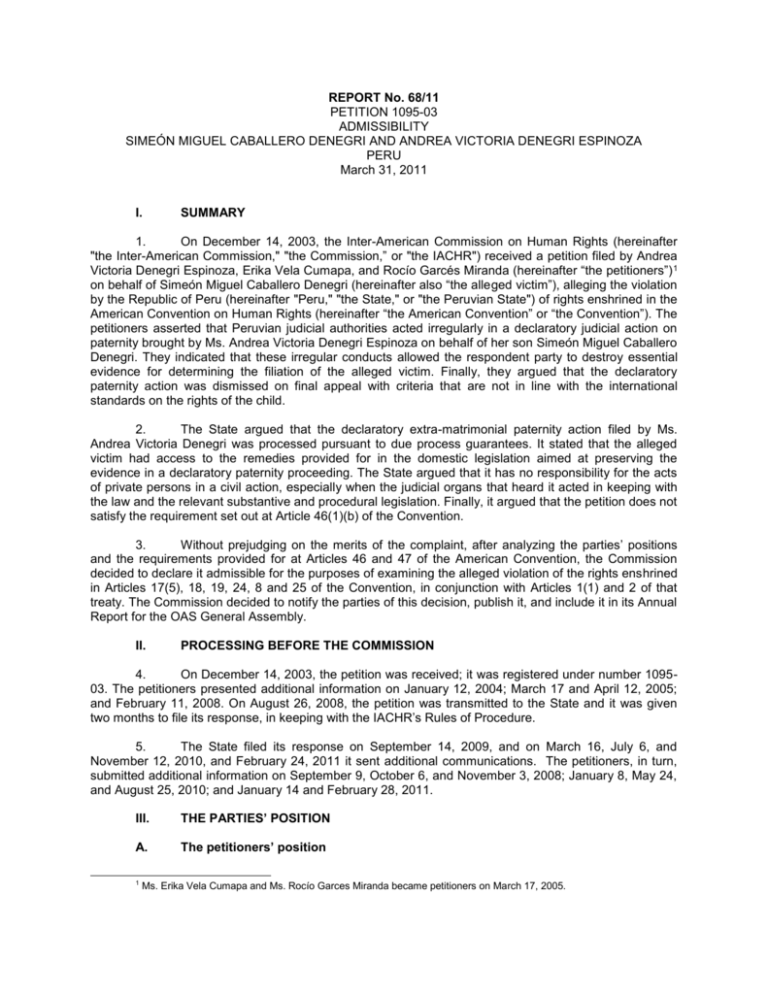
REPORT No. 68/11 PETITION 1095-03 ADMISSIBILITY SIMEÓN MIGUEL CABALLERO DENEGRI AND ANDREA VICTORIA DENEGRI ESPINOZA PERU March 31, 2011 I. SUMMARY 1. On December 14, 2003, the Inter-American Commission on Human Rights (hereinafter "the Inter-American Commission," "the Commission,” or "the IACHR") received a petition filed by Andrea Victoria Denegri Espinoza, Erika Vela Cumapa, and Rocío Garcés Miranda (hereinafter “the petitioners”) 1 on behalf of Simeón Miguel Caballero Denegri (hereinafter also “the alleged victim”), alleging the violation by the Republic of Peru (hereinafter "Peru," "the State," or "the Peruvian State") of rights enshrined in the American Convention on Human Rights (hereinafter “the American Convention” or “the Convention”). The petitioners asserted that Peruvian judicial authorities acted irregularly in a declaratory judicial action on paternity brought by Ms. Andrea Victoria Denegri Espinoza on behalf of her son Simeón Miguel Caballero Denegri. They indicated that these irregular conducts allowed the respondent party to destroy essential evidence for determining the filiation of the alleged victim. Finally, they argued that the declaratory paternity action was dismissed on final appeal with criteria that are not in line with the international standards on the rights of the child. 2. The State argued that the declaratory extra-matrimonial paternity action filed by Ms. Andrea Victoria Denegri was processed pursuant to due process guarantees. It stated that the alleged victim had access to the remedies provided for in the domestic legislation aimed at preserving the evidence in a declaratory paternity proceeding. The State argued that it has no responsibility for the acts of private persons in a civil action, especially when the judicial organs that heard it acted in keeping with the law and the relevant substantive and procedural legislation. Finally, it argued that the petition does not satisfy the requirement set out at Article 46(1)(b) of the Convention. 3. Without prejudging on the merits of the complaint, after analyzing the parties’ positions and the requirements provided for at Articles 46 and 47 of the American Convention, the Commission decided to declare it admissible for the purposes of examining the alleged violation of the rights enshrined in Articles 17(5), 18, 19, 24, 8 and 25 of the Convention, in conjunction with Articles 1(1) and 2 of that treaty. The Commission decided to notify the parties of this decision, publish it, and include it in its Annual Report for the OAS General Assembly. II. PROCESSING BEFORE THE COMMISSION 4. On December 14, 2003, the petition was received; it was registered under number 109503. The petitioners presented additional information on January 12, 2004; March 17 and April 12, 2005; and February 11, 2008. On August 26, 2008, the petition was transmitted to the State and it was given two months to file its response, in keeping with the IACHR’s Rules of Procedure. 5. The State filed its response on September 14, 2009, and on March 16, July 6, and November 12, 2010, and February 24, 2011 it sent additional communications. The petitioners, in turn, submitted additional information on September 9, October 6, and November 3, 2008; January 8, May 24, and August 25, 2010; and January 14 and February 28, 2011. III. THE PARTIES’ POSITION A. The petitioners’ position 1 Ms. Erika Vela Cumapa and Ms. Rocío Garces Miranda became petitioners on March 17, 2005. 2 6. The petitioners stated that on August 15, 1997, Ms. Andrea Victoria Denegri Espinoza filed a civil action before the First Family Court of Lima on behalf of her son Simeón Miguel Caballero Denegri, who was 8 years old at the time. They alleged that said action had the purpose of obtaining the judicial declaration of paternity of the alleged victim by Mr. SCB, with whom Ms. Denegri Espinoza had maintained a sentimental and intimate relationship for several years. They indicated that the action was presented against the succession of SCB, made up of his widow and three daughters (hereinafter also “the respondents”), as he had died on March 12, 1991. 7. The petitioners asserted that prior to the judicial action for declaration of paternity, Ms. Andrea Victoria Denegri brought a “Preparatory Proceeding for Absolution of Positions,” which they stated is a non-contentious proceeding with the aim of having Mr. SCB examined as to the paternity of Simeón Miguel Caballero Denegri. They indicated that said proceeding concluded on February 25 1991, without Mr. SCB having made any statement. 8. The petitioners stated that in the course of the declaratory paternity action Ms. Denegri Espinoza requested an injunction for the mortal remains of SCB, deposited since March 1991 in the cemetery known as the Cementerio de la Planicie in the city of Lima, to be preserved for DNA testing. On September 9, 1997, the First Family Court of Lima declared the request an injunction to be well-founded, and prohibited the transfer and cremation of the mortal remains of SCB. It is indicated that after the filing of appeal by the respondents, on April 21, 1998, the Sixth Civil Chamber for Family Matters of Lima set aside the injunctive measure, basing its decision on the fact that there was no voucher for the payment of 20,000 new soles set by the First Family Court of Lima as a bond (contracautela)2 in the record, nor any explanation by the plaintiff of “the way or mode the heirs of the respondent Succession would be carrying out acts for the exhumation, transfer, or incineration of [the mortal remains of SCB].” 9. The petitioners argued that as of September 1997 the First Family Court of Lima had accepted the bond offered by the plaintiff Andrea Victoria Denegri in the modality of an annotation of attachment on two vehicles of her property. In this respect, they attached a copy of the resolution of the First Family Court of Lima of September 18, 1997, ordering the Director General of Overland Transport of the Ministry of Transportation and Communication for the “annotation of the attachment measure in the FORM OF REGISTRATION of the vehicles … property of Ms. ANDREA VICTORIA DENEGRI ESPINOZA….”3 In this regard, they argued that the Sixth Civil Chamber for Family Matters of Lima erred in stating that there was no voucher of posting of the bond by the plaintiff. 10. The petitioners stated that in implementing the decision of the Sixth Civil Chamber for Family Matters, on May 7, 1998, the First Court for Family Matters of Lima ordered that an official note be sent to the administration of the Cementerio de la Planicie to set aside the injunctive measure previously granted. They indicated that on that same day the Ministry of Health issued Directorial Resolution No. 014-98 ruling favorably on a request made by the widow of Mr. SCB, consisting of transferring and cremating his mortal remains deposited in the Cementerio de la Planicie, which was done one day later. They noted that on lifting the injunctive measures, the Sixth Chamber for Family Matters of Lima assisted in the destruction of evidence fundamental for verifying the paternity of Simeón Miguel Caballero Denegri. 2 Article 613 of the Code of Civil Procedure of Peru establishes as follows: The purpose of the contracautela is to ensure that the person detrimentally affected by an injunctive measure may be compensated for any damages that its enforcement may cause. The admission of the contracautela, as regards its nature and amount, shall be decided by the Judge, who may accept the one offered by the applicant, graduate it, modify it, or even change it to one he or she considers appropriate. … 3 Communication from the petitioners received on October 6, 2008, annexes, Official Note No. 458-97-1JFL-CM of September 18, 1997, sent by the First Family Court of Lima to the Director General of Overland Circulation of the Ministry of Transportation and Communication. The upper case letters correspond to the original version. 3 11. According to what was reported, after the cremation of the mortal remains of SCB by the respondents, Ms. Andrea Victoria Denegri filed a criminal complaint against them and their legal representatives for an offense against the administration of justice in the modality of destruction of evidence and actual concealment (encubrimiento real). It is indicated that on September 23, 1999 that complaint was archived definitively by the 17th Transitory Specialized Provincial Prosecutor. 12. The petitioners stated that the representatives of Ms. Andrea Victoria Denegri petitioned the First Court for Family Matters of Lima to act at its own initiative to secure DNA evidence with blood samples or other samples as necessary from the three daughters recognized by SCB and from Simeón Caballero Denegri. They reported that said court convened the respondents to complementary hearings with the objective of obtaining blood samples and performing DNA tests. Nonetheless, they indicated that the respondents refused to appear at those hearings. According to what is alleged, prior to calling the hearings, the principal judge of the First Court for Family Matters of Lima had received information from private laboratories ensuring that the DNA evidence in blood or oral mucosa among alleged siblings has a degree of certainty greater than 99% for confirming filiation, and 100% to discard that possibility. 13. The petitioners argued that on January 23, 2001, the First Court for Family Matters of Lima ruled favorably on the action brought on behalf of the alleged victim, after which the daughters and wife of Mr. SBC filed an appeal. They indicated that on June 21, 2001, the Specialized Chamber for Family Matters of the Superior Court of Justice of Lima upheld the judgment of the court of first instance, declaring that SCB is the father of the alleged victim. According to what was alleged, those judicial organs based their decisions on the procedural action of the respondents, in particular on the fact of having cremated the mortal remains of SCB and not having appeared at successive hearings for the performance of DNA tests, despite having received timely notice. 14. The petitioners indicated that the respondents filed a motion for cassation against the decision of the Specialized Chamber for Family Matters of the Superior Court of Justice of Lima, before the Permanent Chamber for Civil Matters of the Supreme Court of Justice. They asserted that on December 23, 2002, the judges of that Supreme Court chamber declared that the motion for cassation was well-founded, and that the claim by the mother and representative of Miguel Simeón Caballero Denegri was unfounded. They noted that the final decision on the motion for cassation was based, inter alia, on that in the concrete case, the respondent is not the alleged progenitor but his succession, that is, it is a matter of persons evidently foreign to the act of conception of the minor child; accordingly the presumption that the trier may have with respect to the conduct of the latter cannot in any way be compelling for declaring filiation. [and] that in a filiation proceeding, in addition to the judicial presumption, one must incontrovertibly attach other absolutely defined evidence that leads the trier to be convinced of the paternity.… 4 15. The petitioners argued that notice of the final decision of the Supreme Court of Justice was given to Ms. Andrea Victoria Denegri on May 14, 2003. They argued that in the November-December period of 2003 the officers of the Peruvian Judicial branch staged a strike, which allegedly impeded them from obtaining copies of the respective judicial record for the drafting and filing of the complaint before that international body. 16. The petitioners indicated that the action of the Peruvian judicial branch allowed the destruction of an item of evidence essential for determining the filiation of Simeón Miguel Caballero Denegri. They argued that in light of the international instruments on the rights of the child ratified by Peru, it was up to the organs of domestic jurisdiction in charge of the declaratory paternity proceeding to produce the evidence necessary for guaranteeing the right to a name and to an identity of the alleged 4 Communication from the petitioners received on February 11, 2008, annexes, judgment of cassation of December 23, 2002, issued by the Permanent Civil Chamber of the Supreme Court of Justice of the Republic, File No. 2675-2001, whereas clauses nine and ten. 4 victim. Finally, they alleged that the Peruvian State is responsible for violating the rights enshrined in Articles 8 and 18 of the American Convention. B. The State’s position 17. The State made a narration similar to that of the petitioners on the decisions handed down in the course of the declaratory extra-matrimonial paternity action brought by Ms. Andrea Victoria Denegri on August 15, 1997. It argued that the final decision of the Permanent Civil Chamber of the Supreme Court of Justice of December 23, 2002, is in line with the domestic legislation and that it is not up to the IACHR to review the decisions adopted by the Peruvian courts, especially when they acted in keeping with the guarantees of due process and within their jurisdiction. 18. The State affirmed that Law 28.457 establishes that in cases of that nature, the refusal of the alleged father to undergo a DNA exam is punished by the declaration of paternity of the minor. Nonetheless, it held that the same consequence is not applicable with respect to the successors of the alleged father, as there is no “legal regulation for the biological investigation of paternity to reach them.” It added that the members of the Supreme Court of Justice could not order a test that is not regulated in the domestic legislation or “compel persons to undergo acts of providing blood for acts they did not perform [which] would be an attack on the right of respondents to their integrity and to the recognition of their juridical personality.” 19. The State alleged that the cremation of the body of Mr. SCB could have been impeded by the plaintiffs in the civil action for declaration of paternity through the injunctive measures provided for in the domestic legislation. In this respect, it noted that Ms. Andrea Victoria Denegri obtained an injunctive measure of non-innovation (una medida cautelar de no innovar) on September 9, 1997, but that the Sixth Civil Chamber for Family Matters of Lima struck it down due to the plaintiff not having produced evidence of a bond, nor having shown the imminence of conduct by the respondents aimed at destroying evidence. It indicated that only after the injunctive measure was declared unfounded did the Ministry of Health issue a directorial resolution authorizing the exhumation and cremation of the mortal remains of SCB. 20. The State argued that “there is no international responsibility for violation of rights committed by private persons, as in the instant case in which highly personal rights, such as filiation, were at issue, mainly because the Peruvian State offered effective measures for avoiding such a violation.” As regards the alleged violation of the right provided for in Article 18 of the Convention, it argued that the alleged victim “is duly registered, has a birth certificate setting forth his last names.” 21. The State said that the initial petition is dated December 18, 2003 5, whereas the notice of the final judgment by the Supreme Court of Justice putting an end to that proceeding for a declaration of paternity took place on May 14, 2003. In this respect, it argued that the petition was filed after the time period established in Article 46(1)(b) of the Convention. Finally, it argued that the facts narrated by the petitioners do not tend to establish a violation of rights protected in the Convention and asked that the IACHR find the complaint inadmissible pursuant to Article 47(b) of that instrument. IV. ANALYSIS OF COMPETENCE AND ADMISSIBILITY A. Competence of the Commission ratione personae, ratione loci, ratione temporis and ratione materiae 22. The petitioners are authorized by Article 44 of the Convention to submit complaints. The alleged victim is a natural person who was under the jurisdiction of the Peruvian State as of the date of the facts alleged. Peru ratified the American Convention on July 28, 1978. Accordingly, the Commission is competent ratione personae to examine the petition. 5 Although in a note of February 24, 2011, the Peruvian State indicated that the first brief by the representatives of the alleged victim is dated December 18, 2003, the record of this complaint includes a communication from Ms. Andrea Victoria Caballero Denegri received by the IACHR on December 14, 2003. 5 23. The Commission is competent ratione loci to take cognizance of the petition insofar as it alleges violations of rights protected by the American Convention alleged to have taken place in the territory of the state party to that treaty. 24. In addition, the Commission is competent ratione temporis, for the obligation to respect and ensure the rights protected by the American Convention was already in force for the State as of the date on which the facts alleged in the petition are said to have taken place. 25. Finally, the Commission is competent ratione materiae because the petition alleged a violation of rights protected by the American Convention. B. Exhaustion of domestic remedies 26. Article 46(1)(a) of the American Convention provides that for a complaint submitted to the Inter-American Commission to be admissible in keeping with Article 44 of the Convention, one must have pursued and exhausted domestic remedies, in keeping with generally accepted principles of international law. This requirement has the purpose of allowing the domestic authorities to take cognizance of the alleged violation of a protected right and, if appropriate, to have the opportunity to recognize it before it is heard by an international body. 27. The complaint raises a violation of rights protected in the American Convention in the wake of an allegedly irregular action by the Peruvian judicial authorities who took cognizance of an action for the declaration of paternity brought by Ms. Andrea Victoria Denegri on August 15, 1997, in representation of her son Simeón Miguel Caballero Denegri. According to the information submitted, said action was decided through a resolution of December 23, 2002, on a motion for cassation in which the Permanent Civil Chamber of the Supreme Court of Justice of Peru dismissed the claim pursued by Ms. Andrea Victoria Denegri. 28. Given that the Supreme Court of Justice is the highest court in the civil jurisdiction in Peru6, and that the instant petition argues the violation of rights provided for in the American Convention stemming from the action of different judicial bodies, including said Supreme Court, the IACHR concludes that the requirement of prior exhaustion of domestic remedies has been met. C. Time period for filing a petition 29. Article 46(1)(b) of the Convention establishes that for a petition to be declared admissible, it must be filed within six months of the date on which the interested party was notified of the final decision that exhausted domestic remedies. 30. According to the information in the record in the IACHR, notice of the final judgment of the Permanent Civil Chamber of the Supreme Court of Justice of December 23, 2002, was given to Ms. Andrea Victoria Denegri on May 14, 2003. 7 This complaint was received on December 14, 2003, i.e. one month after the deadline indicated in Article 46(1)(b) of the American Convention. The petitioners highlighted that due to a strike by officials of the Judicial branch during the month of November 2003, Ms. Andrea Victoria Denegri was unable to obtain the copies of the respective judicial record, prepare her complaint, and submit it in timely fashion to this international body. Article 49 of the Code of Civil Procedure establishes that “justice in civil matters is provided by Justice of the Peace, Justices of the Peace with law degrees, Civil Judges, Judges of the Superior Courts, and judges of the Supreme Court.” 7 Communication sent by regular mail from the petitioners and received by the IACHR on January 12, 2004, annexes, certificate of notice of May 13, 2003, signed by the Secretary of the Permanent Civil Chamber of the Supreme Court of Justice, with annotation of delivery on May 14, 2003. The afore-mentioned certificate of notice was provided by the petitioners further in a communication received by the IACHR on February 11, 2008. 6 6 31. By communications received by the IACHR on November 12, 2010, and February 24, 2011, the State argued that “the petitioner herself recognizes that there is a delay in the submission of the petition, it being evident and beyond doubt that the petition was submitted after the six months she had as a time for filing her complaint before the IACHR….” It added that “this submission after the deadline is exclusively an act of the petitioner, who should be subject to the procedural rules.” 32. Although the State has not submitted information on the alleged strike by the Judicial branch’s officials, according to public information, on October 14, 2003, these officials excused themselves from work as a demonstration and on November of that year they held a strike in the activities of the Judicial branch8. This information also indicates that the Constitutional Tribunal declared the suspension of statute of limitations during the period in which the National Federation of the Judicial Branch Officials held a strike in November 2003 9. 33. Given that the Peruvian State did not present any argument or information refuting the effects of the strike in the Judicial branch for obtaining relevant information and filing the present complaint in a timely manner, the IACHR deems that the passing of a month beyond the time period provided for in Article 46(1)(b) of the Convention is justified, for it would be attributable to facts beyond the control of the alleged victim and related to the administration of justice in Peru. In this regard, and given the circumstances of the instant case, the IACHR considers the admissibility requirement set forth in Article 46(1)(b) of the Convention has been satisfied. D. Duplication of procedures and international res judicata 34. It does not appear from the record that the subject matter of the petition is pending before any other international procedure for settlement, nor that it reproduces a petition already examined by this or any other international body. Therefore, one should consider the requirements established at Articles 46(1)(c) and 47(d) of the Convention to have been satisfied. E. Characterization of the facts alleged 35. For purposes of admissibility, the Commission must decide whether the petition states facts that tend to establish a violation, as stipulated by Article 47(b) of the American Convention, if the petition is "manifestly groundless" or if it is "obviously out of order," as per Article 47(c). The standard of appreciation of these rules is different from that required for deciding on the merits of a complaint. The Commission must perform a prima facie evaluation to examine whether the complaint establishes the apparent or potential violation of a right guaranteed by the Convention, and not to establish the existence of a violation. That review is a summary analysis that does not imply any prejudgment or preliminary opinion on the merits. 36. In view of the information presented by the parties up to this stage of the procedure, the IACHR considers that the alleged lack of diligence of the Peruvian judicial organs in the evidentiary proceeding aimed at verifying the paternity of Simeón Miguel Caballero Denegri could imply a possible breach of the obligations derived from Articles 8 and 18 of the American Convention. In addition, applying the principle of iura novit curia, the IACHR considers that the facts alleged by the petitioners could constitute a possible breach of the obligations established at Articles 17(5), 19, 24, and 25 of the Convention, in conjunction with Articles 1(1) and 2 of the same instrument, all to the detriment of Simeón Miguel Caballero Denegri. 37. In the merits stage the IACHR will assess whether the Peruvian courts placed an unreasonable burden to the legal representative of Simeón Caballero Denegri for granting the injunction order aimed at preserving a fundamental evidence to determine his filiation. This evidence consisted of 8 Boletín Informativo Justicia Viva, edition Nº 10, november-december 2003, page 11, available at: www.justiciaviva.org.pe/boletin/boletin10.pdf. 9 See, v.g., Judgment of the Constitutional Tribunal of November 28, 2007, Case File Nº 04144-2006-PA/TC, reasoning 5, available at: www.tc.gob.pe/jurisprudencia/2008/04144-2006-AA.html. 7 DNA exam in the mortal remains of SCB. The IACHR will take into account whether the deposit of 20 thousand nuevos soles required by the First Family Court of Lima as a bond and whether the reasoning of the Sixth Civil Chamber for Family Matters of Lima for lifting the afore-mentioned injunction order resulted in a breach to the American Convention. Furthermore, the IACHR will assess whether the lifting of an injunction aimed to avoid the destruction of an essential evidence for determining the alleged victim’s paternity was ruled by the Sixth Civil Chamber for Family Matters of Lima in accordance with the principle of the best interest of the child. Finally, the Commission will evaluate whether the way the declaratory proceeding on extra-matrimonial paternity is conducted in Peru is in line with the international standards on the rights of the child. 38. Given that Ms. Andrea Victoria Denegri Espinoza acted in representation of her son Simeón Miguel Caballero Denegri during all stages of the proceeding for a judicial declaration of paternity, the IACHR considers that if the facts alleged are proven, there may be a violation of the rights provided for at Articles 8 and 25 of the American Convention, also to her detriment. 39. Finally, as it is not evident that the claim is groundless or evidently out of order, the Commission concludes that the petition satisfies the requirements established at Articles 47(b) and (c) of the American Convention. V. CONCLUSIONS 40. Based on the foregoing considerations of fact and law, and without prejudging on the merits, the Inter-American Commission concludes that the petition satisfies the admissibility requirements set out at Articles 46 and 47 of the American Convention, and, accordingly, THE INTER-AMERICAN COMMISSION ON HUMAN RIGHTS, DECIDES: 1. To declare the petition admissible in relation to Articles 17(5), 18, 19, 24, 8, and 25 of the American Convention in conjunction with the obligations established at Articles 1(1) and 2 of the same instrument. 2. To notify the State and the petitioners of this decision. 3. To publish this decision and include it in the Annual Report to be presented to the OAS General Assembly. Done and signed in the city of Washington, D.C., on the 31st day of March 2011. (In favor): José de Jesús Orozco Henríquez, First Vice-President; Rodrigo Escobar Gil, Second Vice-President; Paulo Sérgio Pinheiro, Felipe González, Luz Patricia Mejía Guerrero, and María Silvia Guillén, Commission Members; and Dinah Shelton, President (dissenting). 8 DISSENTING VOTE OF COMMISSIONER DINAH SHELTON Assuming for purposes of admissibility that the petitioner’s allegations can be proven, no human right is prima facie violated in this matter and therefore I cannot vote in favor of its admissibility. In terms of the asserted “right to identity” as part of the rights of the child or the family, the State has no affirmative duty to determine the paternity of every child born within its jurisdiction. What is required is for the State to provide fair procedures by which the mother and/or child may assert paternity in order to provide the necessary support for the child and obtain legal recognition of the identity of the father, should the mother deem this is in the best interests of the child during its minority and the life of the father. The State may, and in my view should, allow the decision to seek legal recognition of paternity to be made by the mother during the child’s minority. There are many legitimate reasons why a woman may decide to abstain from disclosing the paternity of her child, reasons consistent with her best interests and those of her child. The pregnancy may be the result of rape or incest. The mother may be escaping an abusive relationship or fear a so-called “honor killing” as a result of family disapproval. She may have decided to give birth and raise a child on her own, with a female partner, or with a step-father. This private decision of the mother should be respected by the State and human rights bodies. There appear to be no compelling reasons to ignore the mother’s decision, including the desire that some children may have to acquire information about their ancestry.10 No human being -- adult or minor -- has an absolute human right to know and have legally recognized the identity of his or her biological parents. No human rights body has suggested there is such an absolute right and, indeed, human rights tribunals have upheld laws limiting the right to know one’s biological parents. Given the absence of any authority on this point, it is not appropriate for the the Commission to legislate the existence of such a right and impose new obligations on the State. A broad right to identity would mean that States have a duty and the unprecedented power to enter into the most intimate details of an individual’s private life. It would imply that each State 10 Note that most cases involving paternity before the European Court of Human Rights have involved fathers seeking to have their paternity recognized over the objections of the mother. The European Court has taken each case on its facts and refused to find a violation in many cases where establishment of paternity has been denied by state procedures or substantive law, taking into account the competing rights of the mother, purported father, and the child. 9 may and should demand that every woman giving birth identify, under penalty of perjury, the father of the child. Closed adoptions would become illegal and the identity of both the mother and father would have to be disclosed.11 Anonymous donations of sperm and ova to assist infertile individuals to procreate would be prohibited, eliminating many in vitro procedures and the possibility for untold numbers of persons to have children. The State could legitimately demand DNA samples from every person within its territory in order to have the information necessary to identify the parents of abandoned children. The risks involved in giving this information and power to the State should not be underestimated. In sum, for the Commission to innovate in this case by recognizing an absolute right to the identity of biological parents would imply the violation of a considerable number of other human rights of women and men, especially the right to privacy, the right to marry and establish a family, and the right to protection of the family. In this case, the petitioner ultimately sought to obtain genetic material from children of the decedent’s marriage. They have a right to privacy and to the protection of their family that must be respected and no right of petitioner is violated by the State refusing to compel these individuals to give evidence about a purported collateral relationship with the petitioner’s child. In the case of Backlund v. Finland, Application no. 36498/05, 6 July 2010, a chamber of the European Court of Human Rights found a violation of Article 8 (right to private and family life) because of discrimination in the statute of limiations regarding paternity actions, but the Court reiterated that its task is not to substitute itself for the competent domestic authorities in regulating paternity disputes at the national level, but rather to review under the Convention the decisions that those authorities have taken in the exercise of their power of appreciation (see, inter alia, Różański v. Poland, no. 55339/00, § 62, 18 May 2006; Mikulić v. Croatia, App. no. 53176/99, §§ 54 and 64, ECHR 2002-I), § 59; and Hokkanen v. Finland, 23 September 1994, § 55, Series A no. 299-A). The Court noted that “[a]part from weighing the interests of the individual vis-à-vis the general interest of the community as a whole, a balancing exercise is also required with regard to competing private interests. In this connection, it should be observed that the expression “everyone” in Article 8 of the Convention applies to both the child and the putative father. On the one hand, people have a right to know their origins, that right being derived from a wide interpretation of the scope of the notion of private life (see Odièvre v. France [GC], cited above, § 42). A person has a vital interest, protected by the Convention, in receiving the information necessary to uncover the truth about an important aspect of his or her personal identity and eliminate any uncertainty in 11 At present, States allow closed adoptions to protect the identity of parents, in particular when the mother seeks it. This situation may arise frequently in cases of rape, incest, other violence, or where the mother is herself a minor. See, e.g. European Convention on Human Rights and Biomedicine, art. 10; African Charter on the Rights and Welfare of the Child, art.24. The Convention on the Rights of the Child does not refer to the matter in Article 21 on adoptions. In the case of Odièvre v. France, Application no. 42326/98, 13 February 2003, a Grand Chamber of the Court assessed the asserted right to identity. The applicant’s mother had requested anonymity and completed a form at the Health and Social Security Department abandoning the girl for adoption. The applicant was adopted and later was able to consult her file to obtain non-identifying information about her natural family, but no further information, even after going to court. The applicant complained of a violation of Article 8. The government argued that the case concerned two competing interests: the applicant's interest in finding out her origins and the interest of a woman who from the outset did not wish to be regarded as the applicant's mother in preserving her private life. The applicant also sought to make contact with her siblings, whose existence she had only discovered on becoming an adult and whom she had never met, thereby implicating their rights. The Court observed that the issue of access to information about one's origins and the identity of one's natural parents is not of the same nature as that of access to a case record concerning a child in care or to evidence of alleged paternity. The Court found no violation of Article 8, observing “that States must be allowed to determine the means which they consider to be best suited to achieve the aim of reconciling those interests in view of the complex and sensitive nature of the issue of access to information about one's origins, an issue that concerns the right to know one's personal history, the choices of the natural parents, the existing family ties and the adoptive parents.” 10 this respect (see Mikulić v. Croatia, cited above, §§ 64 and 65). On the other hand, a putative father's interest in being protected from claims concerning facts that go back many years cannot be denied. Finally, in addition to that conflict of interest, other interests may come into play, such as those of third parties, essentially the putative father's family, and the general interest of legal certainty.” [para. 46]. This case and others suggest that the State does have a duty to create fair procedures by which a mother and/or child may obtain legal recognition of paternity, but it is a limited duty and is founded primarily on the duty of both parents to contribute economically to the upbringing of the child. The State, society as a whole, and the mother all have a legitimate interest in ensuring that the alleged father assume the economic responsibilities incurred with conceiving a child. As Article 18 of the Convention on the Rights of the Child provides: 1. States Parties shall use their best efforts to ensure recognition of the principle that both parents have common responsibilities for the upbringing and development of the child. Parents or, as the case may be, legal guardians, have the primary responsibility for the upbringing and development of the child. The best interests of the child will be their basic concern. The State certainly has an interest in protecting the child from penury. That general interest gives rise to a right and a duty to adopt the laws and procedures necessary to ensure that parents or guardians contribute financially to the extent possible to ensuring that children can be raised in a life of dignity and well-being. The duty of support extends until a child reaches the age of majority, but it is an obligation that is personal to each parent and ceases with the death of the parent. The obligation does not extend beyond the identified father to reach collateral relatives or even to identify an alleged father after his death, since the rationale for compelling recognition of paternity has largely ceased. In this case, the facts indicate that Peru had appropriate laws and procedures in place for establishing paternity. Unfortunately, the petitioner waited until three weeks before the death of the alleged father before commencing her action and he died before the proceedings were completed. Nothing in these facts implies the responsibility of the State or the violation of a right. The petitioner then waited six years before commencing another proceeding to obtain DNA evidence from the decedent’s corpse. In my view, the State could very well have prohibited such late action altogether and required that paternity be established during the lifetime of the purported father, when he had a duty to support the child. Given this, I do not see that any right of the child to identity or support has been violated through an act for which the State is responsible. The State had no duty to bring a paternity action when the mother failed to do so. Given that the State did provide the possibility of such an action, the petition could be admissible if the petitioner alleged facts indicating that access to justice or due process was denied, but she has not done so. The State’s law allowed the action to go forward even after the death of the alleged father, apparently upon the posting of a financial bond. The petitioner has not suggested that the existence of or amount of the bond was unreasonable, nor is there any reason to question the legitimacy of such a domestic legal requirement, provided the amounts do not preclude access to justice by the poor. Therefore, the facts to not raise a prima facie issue of violation of the right of access to justice. The domestic courts acted promptly on the petition and there are no allegations of delay on the part of authorities at any point in the proceedings. The single allegation questioning the fairness 11 of the process is that the court of appeals made an error. The petitioner does not allege that the error was the result of bias, fraud, corruption, or violation of guaranteed rights. It appears to have been a simple mistake of fact. In my view, an error of this type does not rise to the level of a due process violation, despite the consequences for the petitioner as a result of acts committed by private actors. In regard to the latter, the decedent’s wife acted in accordance with the law in place at the time she had the body cremated, as there was no order in force to prohibit this act. While the wife may have acted to preclude determination of paternity and in bad faith, the State is not responsible for this act and the wife owed no duty to petitioner. I also do not see any prima facie issue of the right to a name. Article 18 provides that every person has the right to a given name and to the surnames of his parents or that of one of them. The child in this case had a name and a surname of one of the parents. There being no prima facie violations of any human right indicated in the allegations, the case is inadmissible.

